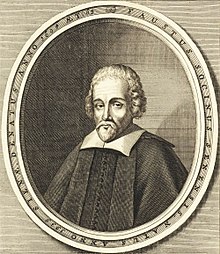Faustus Socinus
| Fausto P. Sozzini | |
|---|---|
 |
|
| Born |
5 December 1539 Siena |
| Died | 4 March 1604 (aged 64) Lusławice |
| Notable work | De auctoritate scripturae sacre, De Jesu Christo servatore |
| Theological work | |
| Language | Italian |
| Tradition or movement | Socinianism |
| Notable ideas | Denied divine foreknowledge of the actions of free agents, Rejected the pre-existence of Christ |
Fausto Paolo Sozzini, also known as Faustus Socinus or Faust Socyn (Polish) (5 December 1539 – 4 March 1604), was an Italian theologian and founder of the school of Christian thought known as Socinianism and the main theologian of Polish Brethren (a Protestant Polish church).
Sozzini was born at Siena, the only son of Alessandro Sozzini and Agnese Petrucci, daughter of Borghese Petrucci b.1490, and granddaughter of Pandolfo Petrucci.
His father Alessandro Sozzini, oldest of eleven brothers, was born 1509 but died in 1541, in his thirty-second year. Fausto had no regular education, being brought up at home with his sister Fillide, and spent his youth in desultory reading at Borgo Scopeto, the family country-seat. To the able women of his family he owed the strong moral impress which marked him through life; his early intellectual stimulus came from his uncle Celso Sozzini, a nominal Roman Catholic, but an esprit fort, founder of the short-lived Accademia del Sizienti (1554), of which young Fausto was a member.
In 1556 his grandfather Mariano Sozzini the younger's will, left Fausto, as only son of the oldest son, one fourth of the family estates, which made him independent. Next year he entered the Accademia degli Intronati, the centre of intellectual life in Siena. He joined with the name Frastagliato, while Celso had the name Sonnacchioso. About this time the jurist Guido Panzirolo describes him as a young man of fine talent, with promise of a legal career; but he showed little interest for law, preferring to write sonnets.
In 1558–1559 the suspicion of Lutheranism fell on him in common with his uncles Celso and Camillo.
Coming of age (1561) he went to Lyon, probably engaging in mercantile business; he revisited Italy after his uncle Lelio Sozzini's death; we find him in 1562 on the roll of the Italian church at Geneva; there is no trace of any relations with Calvin. He returned next year to Lyon. The evangelical position was not radical enough for him. In his Brevis explicatio (Lyons, 1562) of the prologue to St John's Gospel he already attributes to Christ an official, not an essential, deity – already an anti-Trinitarian position; and in a letter of 1563 rejects the immortality of the soul in favour of Christian mortalism; a position subsequently developed in his disputation with the humanist Francesco Pucci.
...
Wikipedia
